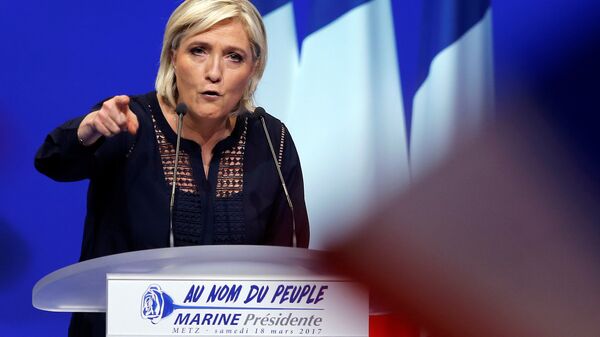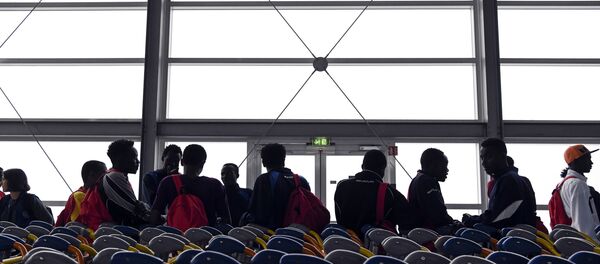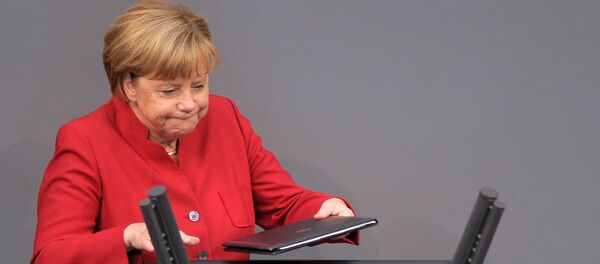Sputnik: The turnout, which had steadily fallen over all previous years, somewhat improved. The 2019 European Parliament elections had a voter turnout of 50.5%, which is 8% higher than the turnout of the elections five years ago. What do you link this to?
Socrates George Kazolias: Among the reasons there was a higher turnout in France this year is the fact that Macron made this election about him and his programme. He even put his face on En Marche Party posters. Macron earned the nickname 'Jupiter' for a reason. After six months of Yellow Vest protests these elections became a sort of referendum on Macron and his En Marche government. Macron also claimed he is the only rampart against the National Rally Party which has grown in strength and thus encouraged many to get out to block the far right. Macron failed and this has further weakened him both in France and within the European Union.
READ MORE: Migrant Influx to Germany May Weigh Down Economy in Years to Come
Sputnik: While the right-wing parties are celebrating victory in Britain, France, Italy and in other countries, the European People’s Party and the Social Democrats will no longer be able to form a majority in the European Parliament. In your opinion, what are the crucial reasons that the two mainstream parties, the socialists and the conservatives, lost the majority?
Socrates George Kazolias: The main reason the traditional parties are in trouble is illegal immigration. Both conservatives and social democrats are blamed for letting a large number of migrants into the EU which many Europeans fear threaten their way of life and security. Also, there is a growing rejection of globalisation which angry citizens, such as the Yellow Vests, blame for economic difficulties like as stubbornly high unemployment in France. One big question in France is that of 'posted workers', allowed under EU rules, which French employers for example use because they are cheaper than domestic labour. This was also a major factor which led a majority in Britain to vote to leave the EU in 2016.
Socrates George Kazolias: There is no doubt the massive arrival of migrants in 2015 pushed more Europeans to question the role of traditional parties and Germany's dominance within the EU. But the rise of the sovereigntists got a solid beginning 20 years ago. The real surprise this year is the good showing of ecologists who did very well among the under 34 year olds. At best, most traditional parties paid lip service to questions of climate and environment. The younger generation are concerned about whether the next mass extinction will begin when they should be worrying about putting their kids through college in 30 years. The Greens could well become the main force to face off against the nationalist or 'identitarian' right.
Sputnik: Marine Le Pen's "National Rally" came first in the European Parliament election in France, gaining 23.31% of the vote. How predictable was this for you?
Socrates George Kazolias: It was clear the National Rally would make a strong showing. The only question was whether they would finish first and in this Macron helped by making this a referendum on his presidency. Basically, there has been no real change since the 2017 presidential elections in the En Marche — NR face off. Marine Le Pen's party has become a permanent front runner and the poor showing of the traditional parties shows the NR is here to stay.
READ MORE: Denmark Wants Permanent Border Controls to Stop Immigration, Islamist Terrorism
By making the NR the party to beat and centering his campaign on that message, Macron has helped the NR become France's opposition party. Macron presents himself as the only serious alternative to NR which explains why many votes from the conservative 'Les Républicains' went to En Marche. The protest vote today is National Rally. The left in France has been practically wiped of the map with the Socialists and Les Insoumis at six per cent each.
Sputnik: What do you attribute this to? What changes can the French people expect?
Socrates George Kazolias: I think the EU will be deadlocked as the new parliament tries to find its footing and new alliances emerge. The EU has been stuck in a rut for a while with an impossible Brexit crisis. Further integration will be put on the back burner as they search for way to roll back the 'populist' surge. Centrists will start listening more to popular anger and will get tougher on immigration. Despite the strong showing of the Greens, I expect the EU to move further right.
In a logical world Macron would be a lame duck. He lost much credibility in France by caving into the Yellow Vest movement. The second place showing of En Marche further weakens his image. He has promised to follow through with his ambitious reform program but, in reality, everything was put on hold until May 26. We shall now see if he is a man of his word.
Macron was never able to impose his views on his EU partners, especially the Germans who have shown some impatience with the French president. Macron was seen as a wall to block the far right wave. That is also a thing of the past.
READ MORE: Denmark Elated as Immigration Costs Down to 'Only' $4.5Bln a Year
Sputnik: Looking at the new alignment of forces in the European Parliament, can we count on improving relations between the European Union and Russia?
Socrates George Kazolias: Europeans are very divided on the question of relations with Russia. It is clear the right wing forces favour warmer relations with Russian unless, of course, they are East European. The Conservatives and Social Democrats still fear Russia is a threat to European security and democracy. Worsening relations with the United States and the US trade war with China could force Europeans to work closer with Russia on international issues.
The views and opinions expressed in this article are solely those of the speaker and do not necessarily reflect Sputnik's position.



